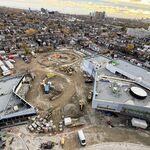ADRM
Senior Member
It's a problematic buzzword to throw around because in the case of Bikeshare in Toronto, TTC stops are far more frequent than Bikeshare stations - as in for people who have already taken transit into the city, there's no logical case for bikeshare to be "intended for last mile" since public transit will more precisely get you to your address. It's an alternative and more affordable mode of transportation with positive externalities such as health and low carbon emission. Let's leave it at that.
That's an oversimplification, though. I bike primarily for a combination of the fact that it's more reliable, less dependent upon traffic (depending on the route), not wedded to scheduling, and much less likely to mean I'm crammed into someone's armpit -- all of those things are as true with bike share as they are with my own personal bike.
That's perfectly logical.





